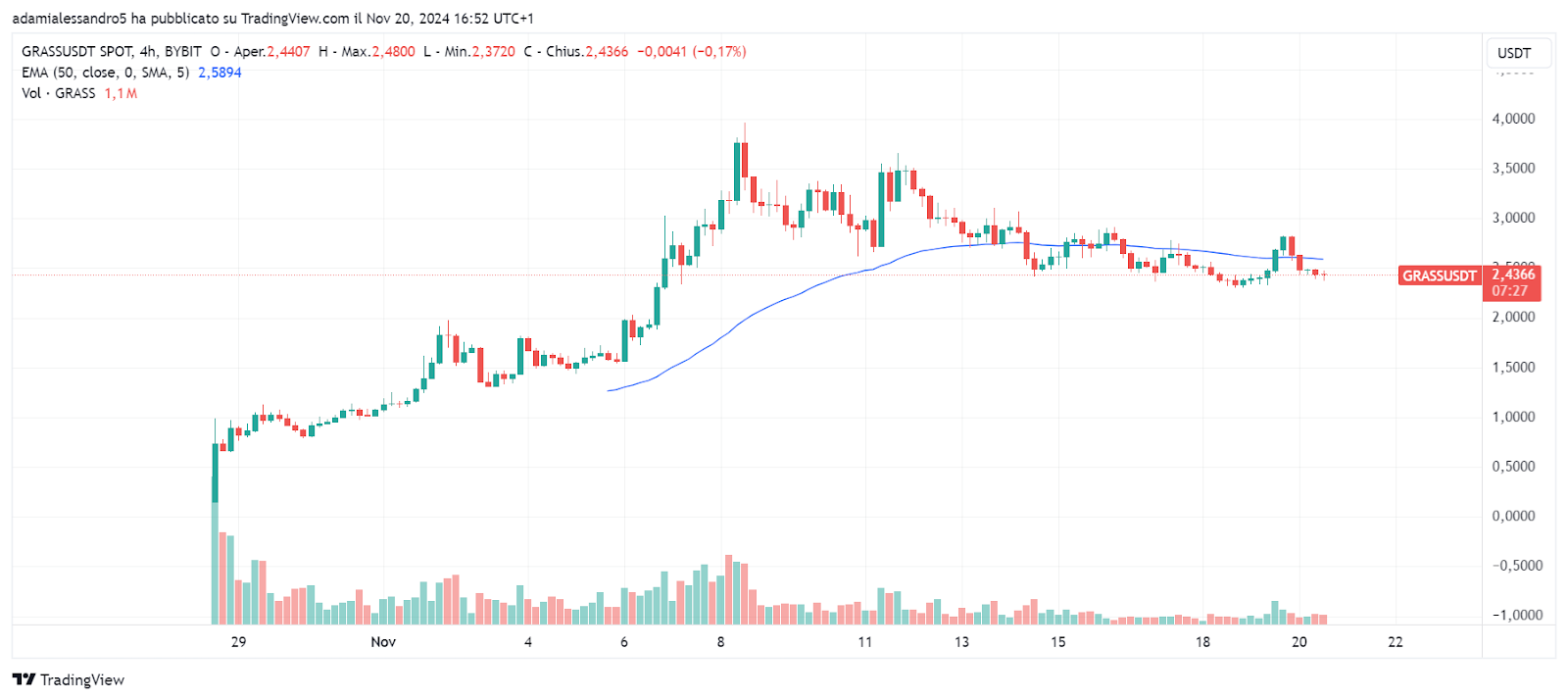[ad_1]
In this article, we explore Bless, a DePIN platform that promises to give a free crypto airdrop to its users.
Recently, the incentivized testnet of the project was launched, which can be participated in simply by downloading a browser extension.
The reward mechanism is similar to that of the competitor Grass: zero cost and guaranteed earnings.
Let’s see all the details below
What is the DePIN Bless platform and how does it work?
Bless is a DePIN platform for shared computational computing with an integrated crypto airdrop program for early users.
Previously known as Blockless, it was co-founded by several entrepreneurs with previous experiences in the Web3 world.
Bless aims to build a network of interconnected devices that can support the growing computational processing needs in the AI sector.
It leverages a new framework for the development of neutral network applications (nnApp) with a nested node infrastructure for resource sharing.
Anyone can share their bandwidth with the project and contribute to the computational demand of websites, applications, and decentralized services.
Bless in turn rewards the same users with a token prize, offering an economic incentive for the creation of an economy of scale.
By doing so, individuals become operators enabled to create computing power, shifting the focus from institutional players to a community-based model.
Using the connection of millions of personal devices, Bless aims to make the Internet more accessible and open to everyone to build and innovate the future.
This platform launched its phase of “incentivized testnet” on Solana on November 12 and in just one week registered the enrollment of 200,000 nodes.
The Bless team has confirmed the future launch of a cryptocurrency, with airdrop distribution to those who will interact in these early stages. Participants of the mainnet will also be rewarded, which will likely be launched by the first quarter of 2025.
We remind you that the project has raised 8 million dollars in funding this year, led by M31 Capital, NGC Ventures, Interop, and Frachtis.
Announcing Bless: The world’s first shared computer, powered by everyday devices.
Users can now power the applications and websites they use automatically, and be rewarded for doing so.
Our incentivized testnet just launched on @solana – join us at https://t.co/lAm1By4Ez2 🌅 pic.twitter.com/Sz9KuIGoRW
— Bless (@theblessnetwork) November 12, 2024
Bless DePIN: download the browser extension and participate for free in the crypto airdrop
The operation of the Bless crypto airdrop program is very simple and intuitive and closely resembles that of the Grass platform.
The first thing to do is to go to the project’s official website and download the browser extension for free.
Ensure you have a stable internet connection. It is not necessary to have a particular network speed nor to have the latest generation hardware.

Source: https://bless.network/
Once the extension is downloaded, the Bless dashboard will automatically open, where you can monitor your activity in network sharing.
To be effectively operational, however, you will need to install the node, which is a virtual DePIN device that can communicate with other infrastructures.
Don’t be scared by these big words: for the installation it is sufficient to click on the button “activate node”. It is advisable to share your referral code with your friends to enjoy a boost in airdrop rewards.
Once users have the node active and running, Bless matches their devices to the workloads best suited to their hardware capabilities.
From here on, you can accumulate points automatically without even having to open the Bless dashboard. The points will be converted into tokens in the future.
The airdrop of the project’s crypto should arrive by Q2 2025 or likely a few months after the launch in mainnet of the platform.

Source: https://bless.network/dashboard
A DePIN crypto airdrop in Grass style not to be underestimated
Although the crypto airdrop of Bless will certainly not make you rich, it should not be underestimated due to promising free gains.
The twin project Grass, for example, has given its users significant rewards in the form of GRASS tokens.
We are not talking about figures with 3 zeros, but about profits in the order of hundreds (sometimes tens) of dollars that should still be related to an economic commitment equal to zero.
If you are looking for more substantial income, you can still farm the airdrop with multiple devices, obtaining a multiple profit.
Furthermore, DePIN projects like Bless do not require either time or particular skills in web3, but simply a device and an internet connection.
It would therefore be a shame to miss out on such an opportunity, where with minimal effort you achieve a decent return.
Let’s not forget, moreover, that DePIN tokens are at the center of a narrative that is receiving a lot of attention from crypto investorsin this period.
It is not a given that they can dump at the listing, as happens for the majority of airdrop tokens, and indeed the initial price action could hold pleasant surprises.
A low-value airdrop, if held, could lead to a much larger gain compared to what was redeemed at launch.
For example, consider that the token GRASS was listed with an initial price of 0.70 dollars and then grew by 450% in a few days up to a maximum of 3.90 dollars.
100 dollars of GRASS tokens at launch could have become 550 dollars if sold with the right timing.

4h chart of the price of Grass (GRASS/USDT), ByBit market
[ad_2]

